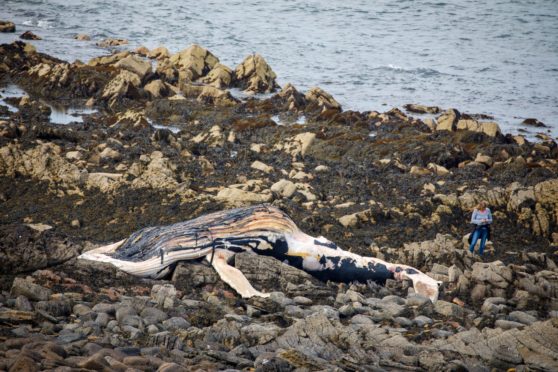A large humpback whale was spotted washed up on the coast near St Andrews on Thursday.
Volunteers at the scene believed the whale to have been dead for some time, making it difficult to identify the cause.
The site where the 10 metre long humpback whale was visited by volunteers from Scottish Marine Animal Stranding Scheme.
Lyndsay McNeill, who runs a volunteer humpback ID group, said that at 10m the whale was most likely a juvenile.
Adults, she explained, were usually around 13 metres in length.
There are fears the whale could be one which has been regularly spotted around Fife.
‘Barney’ recently appeared in a BBC documentary, and has been spotted around the Firth of Forth regularly.
Humpback whales can grow as large as 60ft and primarily feed in cold waters after they breed in warm sub-tropical waters, but repeated visits like Barney’s are thought to be unusual.
Volunteers were unable to confirm if the whale stranded in St Andrews was Barney due to how long the animal had been dead.
Funding by the Scottish and UK Governments, SMASS help to surveil Scotland’s marine wildlife and also understand strandings.
Past sightings
“Investigation of stranded marine animals can yield substantial information on the health and ecology of these fascinating but often little understood species, while also helping to highlight some of the conservation issues they may face,” SMASS says.
Data from SMASS shows that throughout 2020 there was eight strandings around Tayside and Fife.
This included a humpback whale in March 2020, several gray seals, and a porpoise.
A recent six-hour rescue operation to save a stranded humpback was unsuccessful.
Rescuers were forced to humanely kill the animal after repeated attempts to assist it to refloat.
The 3.7m long calf was eventually killed by a trained marksman.
What to do if you find a stranded whale
SMASS say anyone who spots a stranded marine animal in Scotland can lodge a report through their website.
They say: “Depending on the condition and location of the carcass, pathologists may collect the carcass for necropsy or arrange for samples to be taken for analysis.
“They can also provide advice and assistance on how to manage removal and disposal of the carcass.”
